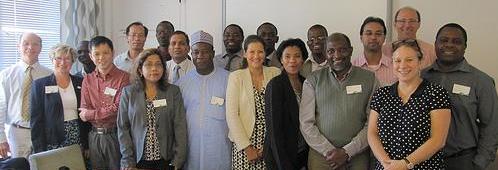
University lecturers and researchers at the first Integrated Water Resources Management (IWRM) Knowledge Centres Workshop in Stockholm, Sweden.
The workshop which was put on by the Global Water Partnership (GWP) Organisation sought to build a working relationship between GWP Partner universities and to explore how the IWRM ToolBox could be used in the academic environment of universities to support the teaching of water resources management. It was felt that the IWRM ToolBox could be better positioned in university curricula by providing hands-on training on the resource to the practitioners in the field. Impetus to develop the workshop was also sparked by an IWRM ToolBox Survey carried out by the GWP earlier in the year which illustrated that more use could be made of the valuable resource.
Amongst the 16 representatives chosen to attend the global workshop were three university lectures from the Caribbean region. They included Dr. Adrian Cashman, Lecturer at the Centre for Resource Management and Environmental Studies (CERMES) based at The University of the West Indies (UWI) Cave Hill Campus in Barbados; Dr. Riad Nurmohamed, Lecturer at the Anton De Kon University of Suriname; and Dr. Arpita Mandal, Lecturer at the Centre for Environmental Management at The UWI Mona Campus in Jamaica.
According to Dr. Cashman, the workshop took stock of how IWRM was being presented in universities and at what level (graduate or post-graduate); as well as what aspects of IWRM were or were not being addressed.
Presentations by participants giving examples of university programmes and courses in water resource management were made by participants from West Africa, South East Asia, the Caribbean, China and Europe. Dr. Adrian Cashman gave the presentation for the Caribbean region providing an overview of the water courses and programmes at The UWI Cave Hill Campus in Barbados.
Dr. Cashman stated that from the sharing of experiences and programmes in various regions it was clear that a very wide variety of approaches have been adopted across the globe. According to him, it was also evident that different aspects of IWRM were incorporated into the courses. On the other hand there were also major differences in course content amongst the regions.
Global Water Partnership-Caribbean (GWP-C) was able to get feedback on the workshop experience from Dr. Cashman and Dr. Nurmohamed both of whom are members of GWP-C. Here’s some of what they shared about the IWRM ToolBox workshop:
Feedback from Dr. Adrian Cashman:
Dr. Cashman felt that the workshop provided an excellent opportunity for the participants to share their experiences in teaching water resources management and to exchange information. He explained that the workshop also contributes to the fostering of a community of knowledge and practice and the building up of personal contacts between academics.
He pointed out that GWP has the opportunity now to use the outcomes from the workshop to feed into its long-term goal of establishing IWRM Knowledge Centres in national and regional universities and to support specific disciplines. Dr. Cashman believes that The University of the West Indies (UWI), as a truly regional university is well placed to play its role in supporting such a centre for the Caribbean.
Feedback from Dr. Riad Nurmohamed:
Dr. Nurmohamed stated that the workshop provided a unique opportunity to meet specialists in the field of water but moreover GWP partner universities. He suggested that the IWRM Knowledge Centres workshop could possibly be organised once every five (5) years so that partner universities can further discuss and suggest ways to move IWRM and the ToolBox forward. He explained that it would be useful for the representatives from the universities that attended the workshop to share their material and to also play a role in building capacity for other university partners that require assistance in IWRM.
Dr. Nurmohamed stated that a network of universities that use the IWRM ToolBox in the region should become more visible. He noted that his university (The Anton de Kom University of Suriname) is making gradual steps in bringing IWRM to the fore at the university and Suriname on a whole. Currently at the Anton de Kom University, the ToolBox is referenced as an information resource.
GWP-C by working through its partners which include tertiary level institutions plans to support knowledge sharing with such institutions in learning more about the IWRM ToolBox and exploring the possibilities to include the ToolBox as a source of knowledge in its programmes.